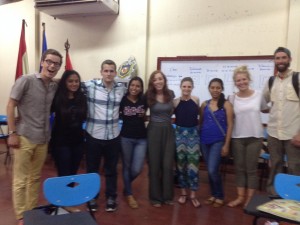In Nicaragua there are many differences in human rights compared to the United States. Por ejemplo, pedestrians do not have the right of way in Nicaragua. This example is among the most obvious but least significant differences.
In Nicaragua, women don’t have a right to financial independence. They have no avenues through which they could gain financial independence. It appears that women are largely expected to keep the home, take care of the children, and not have careers. This socialization makes it virtually impossible for women to pursue a different life, make their own money, and stop being dependent on someone else. This financial dependence means that many people (generally men) are able to abuse the women that depend on them without any repercussions. The legal system in Nicaragua doesn’t enfranchise the women of the country, making justice an elusive and nigh-unobtainable goddess. Because of the perpetual dependence on men and the machismo culture in Nicaragua, many women in Nicaragua don’t have the right to reproductive self-determination. Many of the community leaders that we’ve met with have told us that many young women here feel that their only chance for moving out of their parent’s household is to become pregnant with someone’s child, thus ensuring that they will be taken care of, but also ensuring perpetual independence. Many women are becoming pregnant at a very young age because of these notions.
Many women are also becoming pregnant at a very young age because of sexual violence that is perpetuated by the machismo culture in this country. In this culture, wearing a condom is seen as weak. Many men don’t wear condoms, and many women don’t have the social capital to force men to wear condoms. Based on our meetings with organizations and individuals who work with women and families in the country, teen pregnancy rates are extremely high.
Issues of environmental justice have also been extremely visible during our time in Nicaragua. Many people we’ve met or seen have been living by whatever means necessary. We’ve seen people cooking over smoky fires in front of their houses and heard tales of life in city dumps and people spending years searching through the trash for recyclable materials. We’ve visited communities that have grown on the outskirts of urban areas due to relocation because of natural disasters, and countless other tales of people living in harmful environments because that lifestyle is the only lifestyle they could access. Many people in this country disproportionately bear the brunt of negative environmental externalities from the actions of others.
But of all these social and human rights issues, we believe our group did not get the opportunity to investigate the starkest issues of human rights in Nicaragua. There are two sides to the country of Nicaragua, the Pacific side and the Caribbean/ Atlantic side. We got the opportunity to speak to two students at the National University in Leon from the Atlantic side of the county. They said that they were among the few students that had the opportunity to participate in higher education from their side of the country. Even with this privilege or opportunity, they recounted multiple instances of discrimination or abuse. This abuse of this minority is the largest civil rights violation in Nicaragua because of how oblivious the hegemony is to it. When asked, a group of students from the Pacific region of the country claimed there were no instances of abuse or discrimination against other ethnic minorities in the country. This was very surprising to our group, as we had just heard the opposite from the ethnic minority itself at the same university. This was initially surprising to hear, but when you think about it, of course majority will claim the opposite of the minority.
To end on a lighter note, Tal Vez Es Para Siempre es basura. Having only watched forty minutes of it, we knew the entire plot of this romantic comedy. Don’t be fooled by the fact that you’re watching it in Nicaragua, the movie’s not in Spanish, but rather it has Spanish subtitles. If you pay 200 Cordobas to watch this movie in hopes of practicing your Spanish, you will be sorely disappointed.

